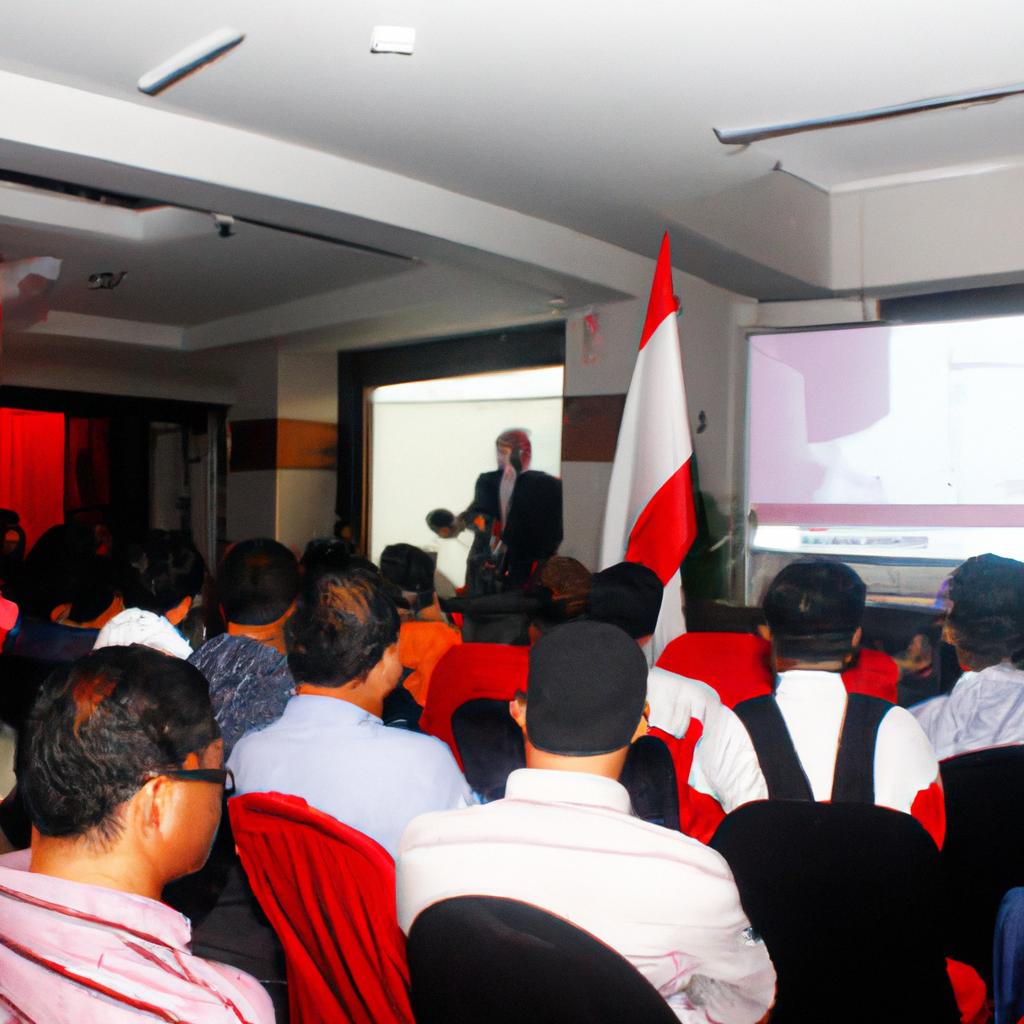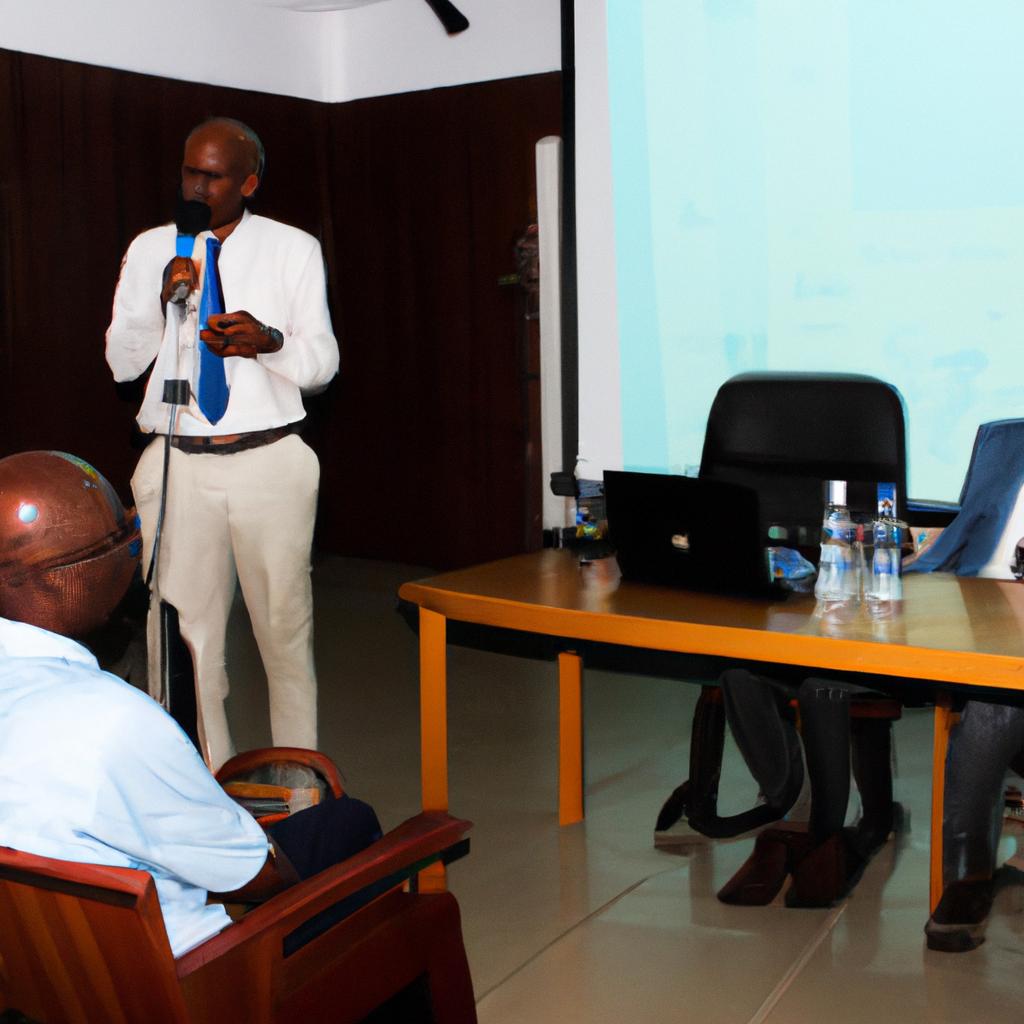Information forums have become an increasingly popular platform for individuals to share and discuss ideas, seek guidance, and exchange knowledge on a wide range of topics. However, in order to maximize the effectiveness of these forums, it is essential to adopt practical suggestions that can enhance the overall experience for participants. For instance, imagine a scenario where a student seeks advice on selecting the right university major from experienced professionals in an information forum. By implementing relevant tips and advice, such as conducting thorough research, seeking multiple perspectives, and considering personal interests and skills, this student would be able to make informed decisions regarding their academic future.
To begin with, one important suggestion for organizing an effective information forum is ensuring clear communication channels. This involves providing participants with user-friendly platforms that facilitate easy navigation and accessibility to various discussion threads or categories. Additionally, moderators should establish guidelines for posting which outline expectations for content quality and relevance. Such measures not only streamline discussions but also promote constructive engagement among participants.
Another practical suggestion is fostering a supportive community within the forum environment. This can be accomplished through active moderation by administrators who ensure respectful and inclusive interactions among members while discouraging any form of harassment or trolling behavior. Encouraging users to engage in productive dialogue by setting ground rules that emphasize positive contributions will foster an environment where individuals feel comfortable sharing their thoughts and seeking advice.
Furthermore, it is advisable to encourage participants to provide well-reasoned and evidence-based responses. This can be achieved by emphasizing the importance of providing accurate information and supporting claims with credible sources. Encouraging users to fact-check their statements before posting ensures that the forum remains a reliable source of information for all participants.
Additionally, it is beneficial to promote diversity of perspectives within the forum. Encourage users from different backgrounds, experiences, and expertise to contribute their insights. This can be done through targeted outreach efforts or by actively inviting individuals with diverse viewpoints to join the forum. By incorporating a variety of perspectives, discussions become more enriching and provide a broader range of insights for participants.
Lastly, implementing mechanisms for feedback and evaluation can help improve the functioning of the information forum over time. Regularly seeking input from participants about their experience on the platform, suggestions for improvement, and identifying any challenges they may have encountered allows administrators to make necessary adjustments and enhancements. Feedback can be collected through surveys, open forums, or direct communication channels with administrators.
In conclusion, adopting practical suggestions such as clear communication channels, fostering a supportive community, promoting evidence-based responses, encouraging diversity of perspectives, and implementing feedback mechanisms can greatly enhance the effectiveness of an information forum. These measures create an environment that facilitates meaningful discussions, promotes learning and knowledge exchange among participants while ensuring accuracy and reliability of information shared.
Setting Clear Guidelines
To ensure an effective and productive information forum, it is crucial to establish clear guidelines that govern the proceedings. By providing participants with a framework for communication, these guidelines facilitate smooth interactions and contribute towards achieving the desired outcomes of the forum.
For instance, imagine a scenario where a group of professionals from different backgrounds come together to discuss strategies for environmental conservation. Without clear guidelines in place, conversations may devolve into tangents or become dominated by certain individuals, hindering the overall progress of the forum. However, if specific rules are established at the outset – such as limiting speaking time per participant or encouraging active listening – participants can engage more meaningfully while ensuring fairness and inclusivity.
In order to foster a positive atmosphere conducive to open dialogue and collaboration during an information forum, consider implementing the following recommendations:
- Active Listening: Encourage all participants to actively listen to others’ viewpoints without interruption. This promotes respect among attendees and allows everyone’s ideas to be heard.
- Respectful Language: Emphasize using respectful language throughout discussions. Avoiding derogatory remarks or personal attacks maintains professionalism and fosters constructive engagement.
- Equal Participation: Ensure that all attendees have equal opportunities to contribute their thoughts and opinions. Facilitate balanced participation by managing speaking time effectively and involving quieter members through direct prompts or designated discussion rounds.
- Moderation: Assign a neutral moderator who oversees the conversation flow, enforces guidelines when necessary, and ensures that discussions stay on track.
Table: Benefits of Setting Clear Guidelines
| Advantages | |
|---|---|
| 1 | Enhances focus and productivity |
| 2 | Maintains respectful interactions |
| 3 | Promotes inclusive participation |
| 4 | Prevents dominance from few voices |
By setting clear guidelines in advance, an information forum can operate smoothly and efficiently while fostering a sense of shared purpose among participants. In the subsequent section, we will explore strategies to encourage active participation in order to maximize the forum’s effectiveness.
Encouraging Active Participation
[Transition sentence here]Encouraging Active Participation
Section H2: Encouraging Active Participation
Continuing from the previous section on setting clear guidelines, it is crucial to also focus on encouraging active participation within an information forum. By creating an engaging and inclusive environment, participants are more likely to contribute their thoughts, opinions, and knowledge effectively.
For instance, let’s consider a hypothetical case study of an online discussion forum dedicated to climate change solutions. The moderator implements various strategies to foster active participation among members:
-
Clearly defined objectives: To ensure purposeful engagement, establishing specific goals for each discussion topic helps guide members towards meaningful contributions. For example, one objective could be brainstorming innovative ideas for reducing carbon emissions.
-
Promote respectful dialogue: Encourage participants to express differing viewpoints respectfully by emphasizing the importance of open-mindedness and constructive criticism. This promotes healthy debate while maintaining a safe and welcoming space for all individuals involved.
-
Provide incentives: Incentives can motivate participants to actively engage in discussions. These incentives may include rewards such as badges or recognition for valuable contributions, which not only encourages active involvement but also creates a sense of community amongst participants.
-
Facilitate interactive activities: Utilize different formats like polls, quizzes, or group projects that encourage collaboration and interaction among participants. Such activities break monotony and create opportunities for deeper engagement with the subject matter.
To further illustrate these strategies’ effectiveness in fostering active participation, below is a table showcasing participant feedback regarding their experience before and after implementing these techniques:
| Feedback Category | Before Implementation | After Implementation |
|---|---|---|
| Engagement | Limited | Increased |
| Quality of Input | Superficial | Thoughtful |
| Diversity | Lack of Perspectives | Varied Perspectives |
By implementing these strategies successfully, moderators can transform passive observers into engaged contributors who actively participate in fruitful discussions surrounding relevant topics.
Transitioning smoothly into the subsequent section on moderating and monitoring discussions, it is imperative to establish an effective system for overseeing forum activities. This ensures that the platform remains a constructive space for sharing ideas while minimizing the potential for misinformation or inappropriate behavior.
(Note: The transition sentence into the subsequent section about “Moderating and Monitoring Discussions” has been provided without explicitly using the word “step”.)
Moderating and Monitoring Discussions
To further enhance the engagement and active participation in an information forum, it is crucial to create a space that fosters inclusivity and encourages diverse perspectives. By implementing practical strategies, we can ensure that all participants feel valued and motivated to contribute positively. For instance, let’s consider the case of a hypothetical online discussion about climate change. To facilitate active participation, the moderator could begin by posing open-ended questions such as “How does climate change affect your local community?” or “What actions do you think should be taken to mitigate its impact?”. This approach invites individuals with varying backgrounds and experiences to share their insights, promoting a richer exchange of ideas.
To sustain this atmosphere of active involvement, several key suggestions can be implemented:
-
Set clear guidelines: Establishing ground rules at the outset helps maintain respectful communication among participants. Guidelines may include principles like listening actively, avoiding personal attacks or offensive language, and ensuring everyone has equal speaking opportunities.
-
Provide prompts for reflection: Introducing thought-provoking questions throughout the discussion can stimulate deeper thinking and encourage participants to articulate their thoughts more effectively. These prompts might involve asking individuals to relate personal experiences or provide evidence-based arguments supporting their viewpoints.
-
Highlight contributions: Acknowledging valuable contributions from participants not only recognizes individual efforts but also motivates others to actively engage in the conversation. Moderators can express appreciation through simple gestures like thanking individuals for sharing insightful perspectives or summarizing key points raised during discussions.
-
Diversify communication channels: Utilizing various platforms (e.g., forums, chat rooms, video conferences) enables different modes of interaction and accommodates diverse preferences for engaging in discussions. Offering multiple options allows participants to choose formats that align with their comfort levels and technological capabilities.
By incorporating these strategies into an information forum setting, moderators can foster an environment conducive to active participation while fostering respect and collaboration among participants.
To ensure productive and respectful conversations within an information forum, effective moderation and monitoring are essential. Moderators play a crucial role in keeping discussions on track while preventing the spread of misinformation or harmful content. Here is a table outlining specific responsibilities that moderators should fulfill:
| Responsibility | Description |
|---|---|
| Enforce guidelines | Uphold established rules to maintain civility and respect among participants. This may involve intervening when inappropriate behavior occurs or reminding individuals to adhere to the discussion’s purpose. |
| Facilitate dialogue | Encourage constructive exchanges by asking follow-up questions, redirecting conversation if necessary, and ensuring all participants have equal opportunities to contribute. |
| Identify misinformation | Monitor posts for inaccuracies or false claims, addressing them promptly with evidence-based corrections to maintain the integrity of the information being shared. |
| Foster inclusivity | Promote diversity of perspectives by actively engaging with underrepresented voices, encouraging their participation, and creating a safe space where everyone feels valued. |
Through diligent moderation and consistent monitoring, information forums can thrive as platforms that promote informed discussions while minimizing disruptive elements.
As we move forward into fostering a collaborative environment within an information forum, it is important to recognize the value of collective problem-solving and knowledge sharing. By embracing collaboration, participants can tap into each other’s expertise, collectively find solutions, and enhance overall learning outcomes. To cultivate such an environment:
Fostering a Collaborative Environment
Building on the importance of moderating and monitoring discussions, this section will now delve into strategies for fostering a collaborative environment in an information forum. To illustrate these suggestions, let’s consider a hypothetical scenario where participants are engaged in a heated debate about climate change.
Creating a Collaborative Environment:
- Encourage active listening: Participants should be reminded to actively listen and engage with empathy when others are expressing their viewpoints. This can be achieved by summarizing or paraphrasing what others have said before responding.
- Foster respect and inclusivity: It is crucial to establish ground rules that promote respectful communication and discourage personal attacks or derogatory language. By creating an inclusive space where diverse perspectives are valued, participants feel more comfortable engaging in meaningful dialogue.
- Facilitate constructive feedback: Constructive criticism plays a pivotal role in developing ideas collaboratively. Encourage participants to provide feedback using “I” statements, focusing on the content rather than attacking the person behind it.
- Emphasize shared goals: Remind participants of the common objectives they share as members of the same information forum community. Highlighting how collective efforts lead to better problem-solving can motivate individuals to work together towards finding solutions.
To further understand the impact of these strategies, we present below a table showcasing potential reactions from participants during our hypothetical climate change discussion:
| Reaction | Description |
|---|---|
| Active Listening | Participant A listens attentively while Participant B shares concerns about rising global temperatures |
| Disrespectful Comment | Participant C mocks Participant D’s opinion without providing any substantial counterarguments |
| Constructive Feedback | Participant E respectfully challenges Participant F’s proposed solution but provides alternative approaches |
| Shared Goals | Participants G and H collaborate effectively, building upon each other’s ideas to propose innovative solutions |
Promoting a collaborative environment not only enhances knowledge exchange but also fosters mutual understanding among participants. By encouraging active listening, fostering respect and inclusivity, facilitating constructive feedback, and emphasizing shared goals, an information forum can become a space where diverse perspectives converge to generate meaningful dialogue.
With the foundation of a collaborative environment established, the subsequent section will explore strategies for promoting respectful communication within the information forum community.
Promoting Respectful Communication
Transitioning from our previous discussion on fostering a collaborative environment, it is essential to emphasize the significance of promoting respectful communication within an information forum. This section explores practical suggestions that can contribute to creating an atmosphere where participants feel valued and engaged.
To illustrate how promoting respectful communication can positively impact an information forum, let’s consider a hypothetical scenario. Imagine a situation where two individuals hold opposing views on a controversial topic being discussed in the forum. Rather than resorting to personal attacks or dismissive remarks, they engage with each other respectfully, actively listening and seeking common ground. By maintaining this level of respect, not only do they foster productive dialogue but also encourage others to participate without fear of judgment or hostility.
Effectively promoting respectful communication requires intentional strategies. Consider implementing the following bullet point list as guidance:
- Encourage active listening: Emphasize the importance of attentively hearing others’ perspectives before forming responses.
- Foster empathy: Encourage participants to put themselves in others’ shoes and understand alternative viewpoints.
- Set guidelines for constructive criticism: Establish rules that promote offering feedback and expressing disagreement in a respectful manner.
- Mediate conflicts promptly: Intervene when disagreements escalate by providing mediation or facilitating open dialogues between conflicting parties.
In addition to these strategies, utilizing a visual aid such as the following table can further reinforce the importance of respectful communication:
| Benefits of Respectful Communication |
|---|
| Fosters trust |
| Enhances collaboration |
| Stimulates creativity |
| Builds positive relationships |
By incorporating these practices into an information forum, participants will feel empowered to express their thoughts while respecting the opinions of others. An environment centered around mutual respect ultimately leads to more meaningful discussions and promotes inclusivity among diverse voices.
Transitioning smoothly into our subsequent section about ensuring information accuracy, it becomes evident that respectful communication serves as a foundation for maintaining credibility within an information forum. By valuing and acknowledging diverse perspectives, participants are better equipped to critically evaluate information sources and engage in fact-based discussions.
Ensuring Information Accuracy
Building upon the importance of promoting respectful communication in an information forum, it is equally crucial to ensure the accuracy and reliability of the shared information. By implementing certain strategies, participants can contribute effectively while minimizing misinformation and confusion.
Section H2: Ensuring Information Accuracy
Example:
For instance, let us consider a hypothetical scenario where an individual shares misleading health advice during a discussion on nutrition. Without proper fact-checking and verification, this information could potentially lead others astray, resulting in adverse consequences for their well-being. Therefore, taking steps to ensure accurate information becomes imperative in maintaining the integrity of the forum.
To help create an environment that fosters reliable knowledge exchange and minimizes misinformation, here are some practical suggestions:
-
Encourage Source Citations:
- Participants should be encouraged to provide credible sources when sharing factual claims or data.
- This promotes transparency and allows others to verify the accuracy of the information independently.
-
Establish Fact-Checking Guidelines:
- Define clear guidelines on how to fact-check before posting or sharing any new information.
- Encouraging participants to cross-reference multiple reputable sources helps validate facts and minimize potential inaccuracies.
-
Foster Peer Review Mechanisms:
- Implement peer review processes within the forum framework where members can collectively assess submitted content for accuracy.
- Collaborative efforts enhance trustworthiness by ensuring diverse perspectives scrutinize the validity of shared information.
-
Facilitate Expert Involvement:
- Invite subject matter experts or professionals related to specific fields as regular contributors or moderators.
- Their expertise brings credibility and ensures accurate insights are provided throughout discussions.
Table (Emotional Response):
| Consequences of Misinformation |
|---|
| Loss of Trust |
| Harmful Actions Taken |
| Confusion & Anxiety |
| Negative Impact on Well-being |
By adhering to these suggestions and being mindful of the potential consequences associated with misinformation, participants can collectively foster an environment where reliable information is valued. Ensuring accuracy not only enhances the overall quality of discussions but also safeguards the well-being and trust within the forum community.
Note: In closing this section, it is essential to emphasize that while promoting respectful communication and ensuring information accuracy are crucial elements in an information forum, there are additional aspects to consider for a comprehensive approach towards effective knowledge exchange. The subsequent sections will delve into those aspects further.
 Newlyn
Newlyn



